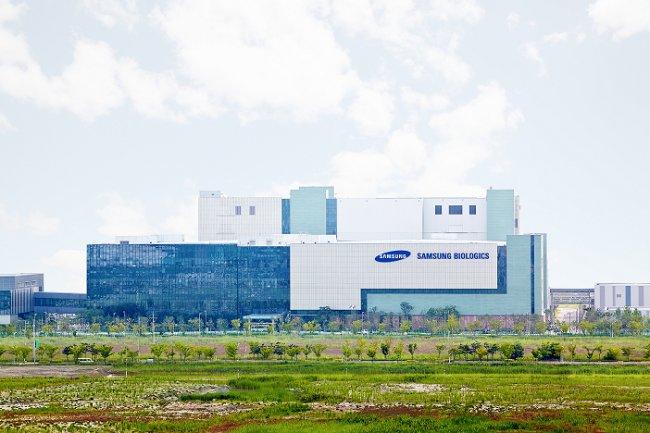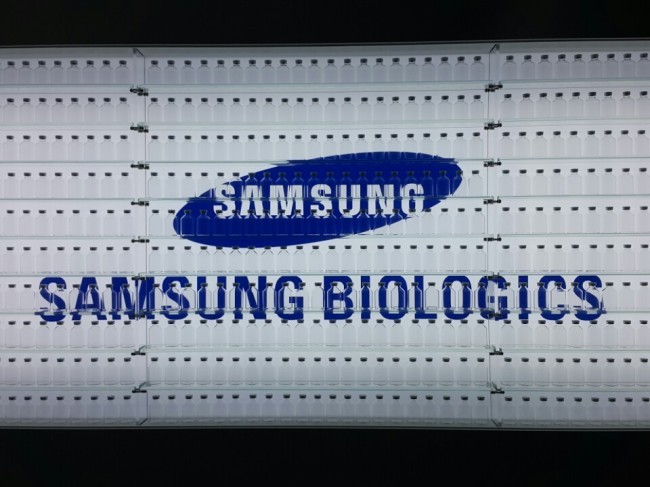[Newsmaker] Samsung BioLogics to make blockbuster IPO
By Sohn Ji-youngPublished : April 28, 2016 - 14:24
Samsung BioLogics on Thursday said that it would pursue an initial public offering on South Korea’s main bourse, the KOSPI, with plans to complete the IPO process within this year.
The company stated plans to select advisers to lead its IPO by next month to decide on the exact timing and the volume of shares to be offered.
Samsung BioLogics declined to comment on the potential size of the IPO. However, industry analysts estimate at least 3 trillion won ($2.6 billion) worth of new shares will be issued through the offering and that its market valuation stands at around 10 trillion won.
The company stated plans to select advisers to lead its IPO by next month to decide on the exact timing and the volume of shares to be offered.
Samsung BioLogics declined to comment on the potential size of the IPO. However, industry analysts estimate at least 3 trillion won ($2.6 billion) worth of new shares will be issued through the offering and that its market valuation stands at around 10 trillion won.

“By going public, we will pursue greater corporate transparency in line with global standards,” Samsung BioLogics’ chief executive Kim Tae-han said in a statement. “We will continue to make bold investments and pursue technological innovation to emerge as a global biopharma company.”
Founded in 2011, Samsung BioLogics is a contract manufacturer of biologic drugs developed by global pharmaceutical companies. It stands at the center of Samsung Group’s recent push into the biopharmaceuticals business, viewed as a lucrative industry to propel the conglomerate’s future growth.
Biologic drugs, complex therapies based on living cells, proteins and other biochemicals, accounted for seven of the world’s ten top-selling drugs in 2015. Produced with recombinant DNA technology, biologics have revolutionized the treatment of chronic illnesses such as rheumatoid arthritis as well as cancer.
The global biologic drug market will surpass about $390 billion in sales by 2020, taking up nearly a third of the global pharmaceutical market by value, according to a March report by the IMS Institute for Healthcare Informatics.

The Samsung affiliate stated that it would use the new capital generated by the IPO to “innovate and invest in its technology, product quality and customer service,” with aims to enhance its global competitiveness.
According to Samsung BioLogics spokesperson Kang Suk-yoon, a majority of the new capital will go toward financing the construction of the firm’s third and fourth production plants and investment toward its biosimilars affiliate Samsung Bioepis.
Samsung BioLogics currently operates two production plants, with construction currently underway for its third plant. The third plant, being built with an investment of around 850 million won, is scheduled for completion in 2018.
The first plant, which was validated by the U.S. Food and Drug Administration last year, currently manufactures commercial biologics developed by its clients Bristol-Myers Squibb and Roche.
Its second plant, boasting a production capacity of 150,000 liters, began operations in February. It is preparing for validation by the U.S. and Europe.
Upon the completion of the third plant, Samsung BioLogics’ net production capacity will rise to 360,000 liters, making it the world’s largest contract manufacturing organization of biopharmaceutical products.
The firm will continue driving up its production capacity, with plans to start constructing its fourth plant in 2017, though concrete plans have yet to be announced, Kang said.
Eyeing a bright business outlook for the global biopharmaceuticals sector and the expansion of the biopharma CMO segment, Samsung BioLogics aims to record sales of 1 trillion won by 2020 and 2 trillion by 2025.
Meanwhile, Samsung BioLogics’ biosimilars affiliate Samsung Bioepis delayed its plans to list on the U.S. Nasdaq in January this year, citing the volatility in the U.S. biotechnology market. Biosimilars refer to an emerging category of cheaper, near replicas of biologic drugs which have lost patent protection.
By Sohn Ji-young (jys@heraldcorp.com)


![[AtoZ into Korean mind] Humor in Korea: Navigating the line between what's funny and not](http://res.heraldm.com/phpwas/restmb_idxmake.php?idx=644&simg=/content/image/2024/04/22/20240422050642_0.jpg&u=)
![[Exclusive] Korean military set to ban iPhones over 'security' concerns](http://res.heraldm.com/phpwas/restmb_idxmake.php?idx=644&simg=/content/image/2024/04/23/20240423050599_0.jpg&u=20240423183955)



![[Graphic News] 77% of young Koreans still financially dependent](http://res.heraldm.com/phpwas/restmb_idxmake.php?idx=644&simg=/content/image/2024/04/22/20240422050762_0.gif&u=)

![[Herald Interview] Why Toss invited hackers to penetrate its system](http://res.heraldm.com/phpwas/restmb_idxmake.php?idx=644&simg=/content/image/2024/04/22/20240422050569_0.jpg&u=20240422150649)




![[Exclusive] Korean military to ban iPhones over security issues](http://res.heraldm.com/phpwas/restmb_idxmake.php?idx=652&simg=/content/image/2024/04/23/20240423050599_0.jpg&u=20240423183955)



![[Today’s K-pop] Ateez confirms US tour details](http://res.heraldm.com/phpwas/restmb_idxmake.php?idx=642&simg=/content/image/2024/04/23/20240423050700_0.jpg&u=)